The Samsung 750 EVO (120GB & 250GB) SSD Review: A Return To Planar NAND
by Billy Tallis on April 22, 2016 8:00 AM ESTATTO
ATTO's Disk Benchmark is a quick and easy freeware tool to measure drive performance across various transfer sizes.
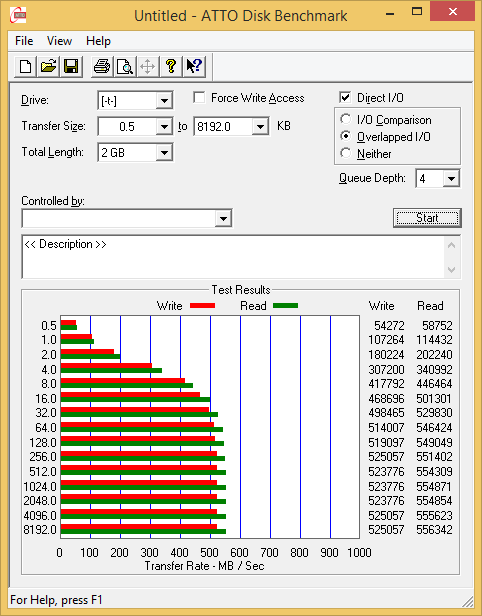 |
|||||||||
The ATTO benchmark shows the 750 EVO has good performance on small transfers and a maximum write speed that is very close to the read speed. The 120GB 750 EVO even provides better write speeds than the 850 Pro 128GB thanks to the former's SLC write caching.
AS-SSD
AS-SSD is another quick and free benchmark tool. It uses incompressible data for all of its tests, making it an easy way to keep an eye on which drives are relying on transparent data compression. The short duration of the test makes it a decent indicator of peak drive performance.
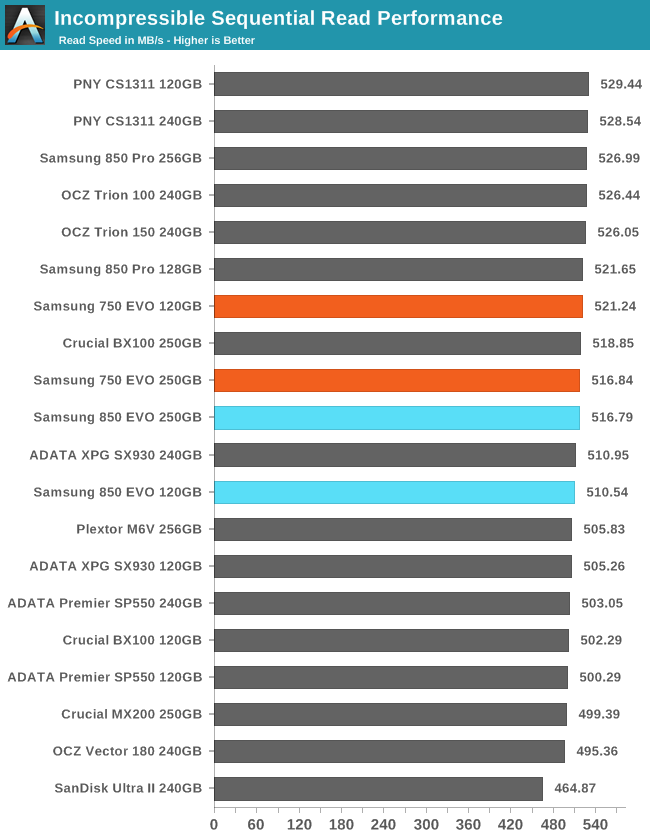
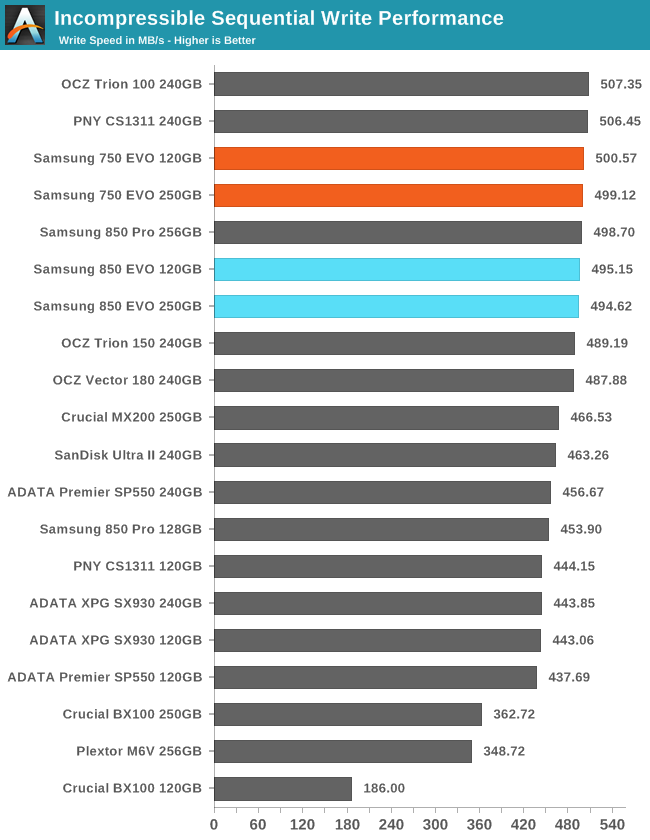
The 750 EVO provides top-notch burst speeds for reads and writes. The write speeds in particular distinguish the 750 EVO from most other TLC drives and low-end MLC drives that suffer from a lack of parallelism at small capacities.
Idle Power Consumption
Since the ATSB tests based on real-world usage cut idle times short to 25ms, their power consumption scores paint an inaccurate picture of the relative suitability of drives for mobile use. During real-world client use, a solid state drive will spend far more time idle than actively processing commands. Our testbed doesn't support the deepest DevSlp power saving mode that SATA drives can implement, but we can measure the power usage in the intermediate slumber state where both the host and device ends of the SATA link enter a low-power state and the drive is free to engage its internal power savings measures.
We also report the drive's idle power consumption while the SATA link is active and not in any power saving state. Drives are required to be able to wake from the slumber state in under 10 milliseconds, but that still leaves plenty of room for them to add latency to a burst of I/O. Because of this, many desktops default to either not using SATA Aggressive Link Power Management (ALPM) at all or to only enable it partially without making use of the device-initiated power management (DIPM) capability. Additionally, SATA Hot-Swap is incompatible with the use of DIPM, so our SSD testbed usually has DIPM turned off during performance testing.
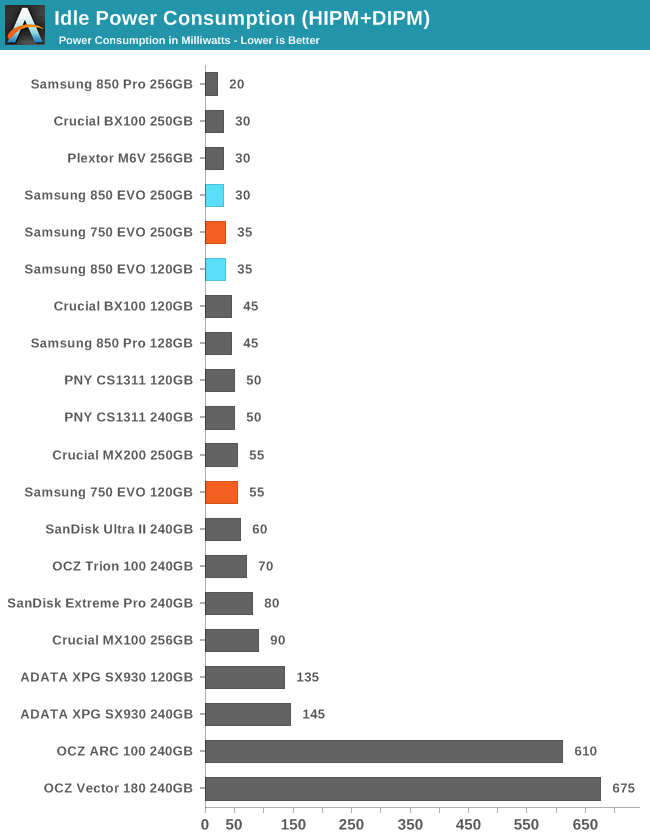
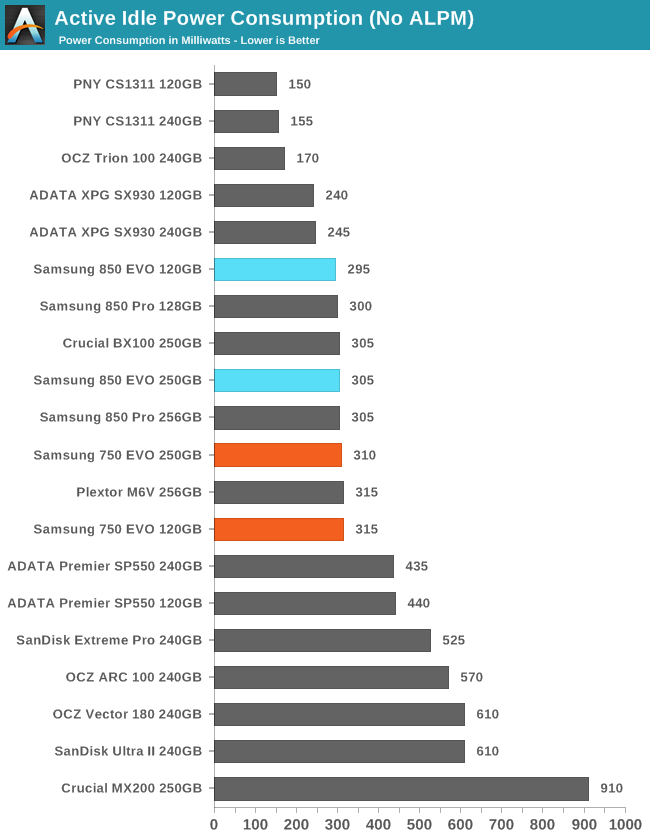
Idle power consumption of the 750 EVO is comparable to other Samsung drives: great when ALPM is enabled, and average when it is disabled.










109 Comments
View All Comments
Ascaris - Thursday, April 28, 2016 - link
Isn't that the truth! Nearly every item comes with glowing reviews mixed in with "mine died in xx time, and I am never going to buy from $company ever again." Consumer routers and hard drives seem particularly bad in that way-- if I avoided all of the ones with horror stories, I'd never have either of them.Another thing people tend to overlook in reliability is the role of a good power supply. A cheap PSU can slowly sap the life from all the components in the system by introducing unacceptable levels of ripple, and you'd never know that was a cause or partial cause of the failure. On a laptop with the brick-style power supply, it is a good idea to replace a failed unit with an OEM unit of recent manufacture (less chance of dried-up caps) than some eBay special of unknown origin (other than to say China, which is where the OEM one came from too, almost certainly).
For desktops, the PSU is something people sometimes skimp on. I've never actually had a prebuilt desktop, but I would bet a lot of them have cheap PSUs, as it is probably a place where pennies can be pinched without a huge increase in RMAs before the warranty expires. I looked at new PCs on the site of one of the major online sellers about a year ago, and I was surprised at how many current models still had 120/240v switches on the PSU, which shows that they are older models without active PFC. That does not necessarily mean they're of poor quality, but it does make me wonder about them.
BrokenCrayons - Friday, April 22, 2016 - link
I think it needs to come down in price before it'll be an acceptable sort of purchase.zepi - Friday, April 22, 2016 - link
SSD's have lost a lot by being so hamstrung by their interfaces. CPU's have limited number of PCI-e connections and motherboards very little space for M.2 slots. SATA 3 is slow and bad protocol for SSD so that race to the bottom is only thing that is of any interest in 2.5" drives.TheinsanegamerN - Friday, April 22, 2016 - link
SATA 3 may not be super fast, but the only observable difference, IME, between an m.2 drive and a sata drive was 2 seconds on boot. Unless you are a content creator working with laarge video/pictures, m.2 has little to offer over sata.Especially given that 2TB sata ssds exist, while m.2 is limited to 512GB, and that 512GB m.2 is more expensive than a 1TB sata ssd. And the ehat that m.2 drives give off compared to sata.
Margalus - Friday, April 22, 2016 - link
It may be "cheap", but it's worthless in my opinion. Only 120GB or 250GB, pretty much too small for anything except a boot drive. If there are no 1TB drives, why bother?TheinsanegamerN - Friday, April 22, 2016 - link
Believe it or not, many people could fit their computer needs in 250GB.I only use about 500GB between all of the games I actually play, and the OS itself.
Meteor2 - Friday, April 22, 2016 - link
Mmmm, I think a lot of people have digital media collections now. I have no DVDs or Blu Rays, but 600 GB of films and TV series.barleyguy - Friday, April 22, 2016 - link
Video doesn't need SSD levels of performance. Any modern spinning disk is fast enough to play video, even up to 4K.Personally, my video server machine is a 250 GB MX200 M-SATA SSD and a 4 TB hard drive.
Meteor2 - Saturday, April 23, 2016 - link
Absolutely but I want a single high-performance disc.Bleakwise - Sunday, April 24, 2016 - link
Why do you want an SSD for cold storage backups? That's just silly.